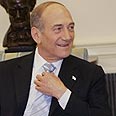
More than he expected: Olmert
צילום: איי פי
Olmert's big day
The prime minister has passed his audition in Washington. Now, its up to him to deliver the goods.
Ehud Olmert has good reason to feel good this morning. He'll return to Israel with more than half of the things he was hoping to gain.
In the negotiations over the text of Bush's and Olmert's post-meeting media statements, the Americans moved from calling Olmert's ideas "positive" to "constructive," finally settling on "brave."
The Bush administration is clearly interested in working with Israel on Olmert's ideas. Apparently, the Americans prefer the word "ideas" rather than "program." It sounds less threatening.
De facto, the administration has adopted Olmert's plan, on condition that Israel will only move to implement it after a concerted, convincing effort to investigate possibilities to negotiate with Mahmoud Abbas. Bush has taken a huge step towards accommodating Olmert's position.
It's not every day that a US president stands alongside an Israeli prime minister who has declared Israel's commitment to moving isolated settlements to large settlement blocs in the West Bank.
Talking and listening
The Americans were all ears with regard to Olmert's plans for convergence, but when talk turned to Iran, it was Israel's turn to listen closely. And the message was simple: At this stage Israel would be well advised to keep a low profile with regard to Iran.
Israel must not act unilaterally against Iran. Despite Israel's claim that Iran's nuclear program could pass the point of no return in the coming months, the United States and the international community must be left to try to solve the crisis diplomatically. At the present time, Israel has no military option vis-à-vis Iran.
The American position with regard to the convergence plan softened following an internal dispute amongst senior US staffers. The administration knows its position will be received harshly in Europe and around the Arab world.
American worries
Secretary of State Condoleeza Rice and a team of senior advisors sat with Olmert yesterday at Blair House, and were treated to a comprehensive explanation about his intentions with regard to the convergence plan. Their questions revealed their concerns: They are worried about a vacuum being created in the Palestinian territories after an Israeli pullout, about the impression of a Hamas victory that will be created in the Arab world, about Israeli actions that will thwart chances for a peace agreement in the future.
They are less worried about the humanitarian crisis being created in the territories, particularly in Gaza, in light of the boycott Israel and other Western countries have declared against the Hamas government. They didn't even really discuss this issue.
Olmert spoke, and for a long time. He was at his best, speaking warmly, friendly, intimately. He appeared to be trying to win over his listeners all at once.
Limited support
Condoleeza Rice asked one of her advisors to talk about how rough the European response was to President Bush's April 14, 2004 letter to then-Prime Minister Ariel Sharon, in which he recognized the legitimacy of Israel's large settlement blocs for the first time.
In her gentle way, Rice was letting Olmert know that there is a price for American support for Israel's unilateral moves. And therefore, that support is not unlimited.
Furthermore, the true test is not measured in words, but in deeds. Olmert's visit to Washington is not the final word. It is the first word.
Olmert, who sat with the president as these words were being written, was swarming Bush with is signature charm. The US administration understands. Now, we can get to work.
On with the show
Today, Olmert will appear before a joint session of Congress to deliver the biggest speech of his life. His speech has been planned and polished, and will move between logic and emotion, between diplomatic speak and points that are sure to evoke enthusiastic applause.
The danger of this type of address is that it will influence everything that comes after it, from Israel's national health basket to the way Shelly Yacimovich votes in the Knesset.
Olmert has created great expectations here in Washington. He's passed his audition. Now, all that's left is to show what he's able to accomplish.










